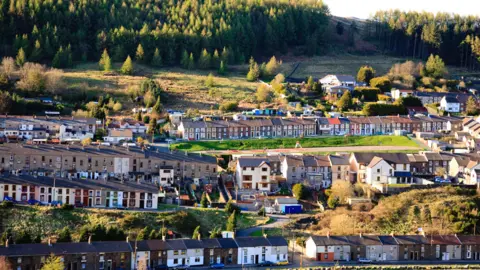Economic action plan 'woolly words' - Conservatives
 Scott Hortop/Getty Images
Scott Hortop/Getty ImagesA new economic action plan for the next 10 years in Wales has been called "woolly" and short on detail by opposition parties.
Firms wanting grants will have to agree to an "economic contract", including reducing their carbon footprint and promoting workers' health.
But the Conservatives said they were "underwhelmed" and called it "50 pages of woolly words".
Plaid Cymru said there were "lots of words, not many numbers".
The action plan also includes simplifying financial support for business.
Economy Secretary Ken Skates said in return for firms agreeing to an "economic contract" around growth and fairness at work, the Welsh Government would provide a "simplified, unified and competitive package of business support".
The plan includes cutting the number of so-called priority sectors and a regional approach to economic development.
 Thinkstock
Thinkstock- Priority sectors reduced from nine to three - advanced manufacturing (such as semi-conductors), tradeable services (including the likes of fintech, online insurance and creative industries) and enablers (digital, renewables and energy efficiency)
- Four foundation sectors - tourism, food, retail and care - a new structure of support, improving skill development and sustainable business models
- Bringing together direct Welsh Government finance for business into an economy futures fund - £100m a year - with businesses having to enter into an economic contract and satisfy they are delivering at least one "call to action" in areas ranging from innovation, research and development to exports
- Three chief regional officers will lead economic development in north Wales; south west and mid Wales; and south east Wales, working with existing city and growth deals, councils and regional skills partnerships
In south east Wales for example, the regional approach could be the "glue" to bring together the Valleys taskforce and city deal.
There has been more prosperity along the M4 corridor and in north east Wales while areas in parts of the south Wales valleys have struggled.
The strategy also wants more regional planning, in terms of housing and transport, with neighbouring local councils expected to work more closely together.
It believes more home-grown businesses should benefit from procurement on top contracts.
There is hope the changes will start being introduced from April.
Mr Skates said it was about getting ahead of the change coming with the "fourth industrial revolution" - the likes of robots and artificial intelligence - by equipping people, businesses and places in Wales "to face the future with confidence".
He told AMs it set a "clear vision" and responded to what communities, businesses and unions had told him.
"It's a plan for everyone in Wales, a plan that meets the needs of today and the opportunities of tomorrow."
But the Conservatives' economy spokesman Russell George said it was an "admission of failure" and devoid of any strategic insight.
"It's Labour's fourth major economic strategy since devolution, and yet gross value added (GVA) has declined over that period, leaving Welsh workers with the lowest take home pay in the UK.
"We are also in the midst of an acute productivity crisis and the practical result of these failures is that Wales has the lowest productivity out of all the home nations and regions."
Plaid Cymru's Rhun ap Iorwerth said: "I read the first few pages this morning - lots of words, not many numbers."
The party's economic spokesman Adam Price welcomed the inclusion of the foundational economy and decarbonisation in the strategy but he told AMs on other measures it was difficult to see where it took us forward and "arguably this is a step back".
But CBI Wales said the plan identified "the right challenges and priorities to guide the Welsh economy in the months and years ahead."
Director Ian Price said the regional approach would need the government to dedicate sufficient resource and expertise to the new chief regional officers.
"The CBI and our members look forward to working with the Welsh Government as they turn this ambitious action plan into a measurable whole-government delivery programme," he added.
UKIP's David Rowlands, a member of the economy committee, said while having some political differences with Mr Skates: "I sincerely do not want him to fail in his comprehensive ambitions for the Welsh economy."
He called for investment in young people, academically and vocationally, "instilling aspirations in our youth who are partners in this enterprise".

Analysis by Sarah Dickins, BBC Wales economics correspondent
Out: Nine priority sectors. In: three national sectors and four foundational sectors, one of which is food which used to be a sector in itself. Three plus four does not make nine of course, but it is not far off.
And instead of economic regeneration being driven centrally, it will come through the three existing growth deals with the UK government.
So are these big changes big enough to kick-start the Welsh economy and improve productivity, which when measured as gross value added (GVA) per person in Wales is 71% of the UK average?
Those people who have been waiting for one tightly-focused "big idea" that will take Wales forward with more better paid jobs and higher living standards will no doubt be disappointed.
It is less a radical plan to grow the economy than a collection of many tweaks and changes to try to improve it.
Perhaps its bravest step is to tell businesses they have to think about the future, about decarbonisation and the way they treat their workforce in order to get Welsh Government cash.
Over time it will be interesting to find out what business leaders privately feel about that and whether action will be taken to ensure it is more than lip service.
